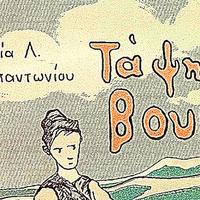41. Το τραγούδι της Αφρόδως
Η Αφρόδω ήρθε σήμερα μαζί με τον Λάμπρο να δει τ' αδέρφια της. Έναν αδερφό είχε, τον Λάμπρο, και τώρα έγιναν είκοσι έξι!
Μα και τα παιδιά ποτέ δεν έλεγαν πως θα έβρισκαν εκεί απάνω τόσο καλή αδερφή.
Εδώ και τρεις μέρες τούς είπε το πιο καλό παραμύθι. Είπε για ένα κάστρο που είχε πόρτες ατσαλένιες και κλειδιά αργυρά· για της Ωριάς το κάστρο.
---
Προχτές τραγούδησε στον Φάνη και στον Δημητράκη ένα τραγούδι που άρχιζε με τα λόγια: «Απόψε ‘νειρευόμουνα». Το είπε χαμηλοβλέποντας και κοιτάζοντας τη ρόκα.
Απόψε ‘νειρευόμουνα –μητέρα, μητερίτσα μου– ψηλόν πύργον ανέβαινα, σε περιβόλι έμπαινα
και δυο ποτάμια με νερό,
—‘ξήγα, μητέρα μ', τ' όνειρο!...
Να είχε δει και κείνη τέτοιο όνειρο; Ήταν κάτι λυπητερό σ' αυτό το τραγούδι. Μα όταν το τελείωσε, χαμογέλασε. Κι άμα η Αφρόδω χαμογελάσει, όλα είναι καλά.
---
Τόσο την έχουν αδερφή, που σήμερα την έβαλαν σε ράψιμο.
—Ράψε, Αφρόδω, τούτο το κουμπί.
—Ράψε μου τον αγκώνα που σκίστηκε.
Όσο κι αν είχαν μάθει στην ερημιά να ράβονται μόνοι τους, ήθελαν το ράψιμο της Αφρόδως. Πάντα πιο καλά ράβουν οι γυναίκες.
Η Αφρόδω κάθισε και μπάλωσε δυο τρεις. Αν μπορεί να μπαλωθούν δασοφύλακες! Ύστερα πήρε τη ρόκα κι άρχισε να γνέθει.
«Τώρα θα μας πει κανένα παραμύθι!» συλλογίστηκαν τα παιδιά.
Όχι, δεν τους είπε παραμύθι· τους είπε την ιστορία του Γιάννη από το Πουρνάρι. Μια ιστορία που την ξέρουν όλοι, μεγάλοι και μικροί.

